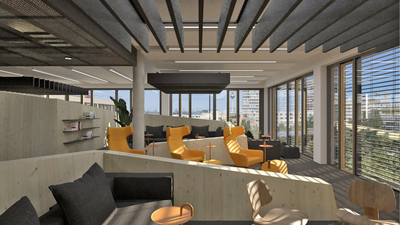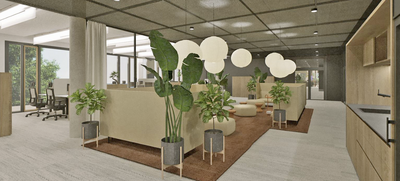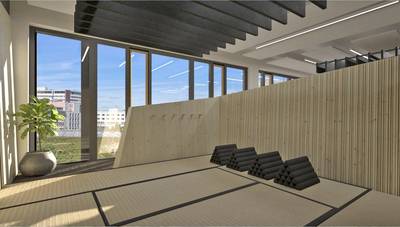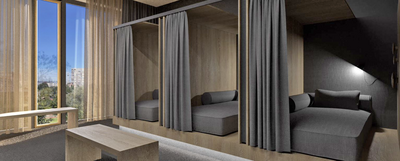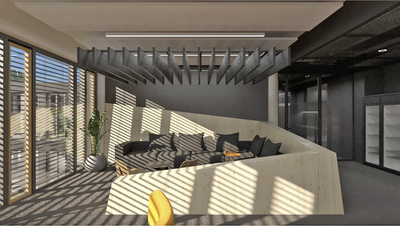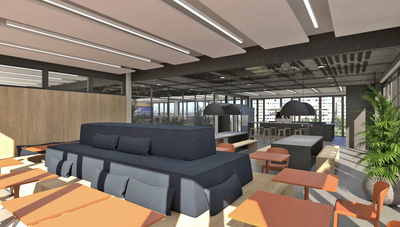Office as a place of identification: more than just a place to work
Mr. Reuter, you decided to rent office space in the new Grasblau building in Berlin. What were your most important decision-making criteria?
Nikolaus Reuter: Three things essentially convinced us, namely the location, the architecture and the "green" aspect of the building. As a company, it is very important to us to make our contribution to a better and healthier future. For our colleagues, but also for society as a whole. And that's where we believe every little contribution counts. State-of-the-art building materials, innovative building technology and sophisticated energy-saving concepts that are ahead of their time come together in the Grasblau. In addition, there is a very modern look with a successful overall architectural concept. From the facade to the glass dome, everything blends ideally into the micro-environment while still making a very striking statement. And to be quite honest, even on our first visit, we were seriously impressed by the all-round view of a green canopy, a proverbial "green lung", in the middle of Berlin. That's exactly why we chose the 5th floor. The light conditions are fantastic. That was also very important to us, because light is life and positive energy.
Even before Covid, a trend toward more home offices or working from alternative work locations could be observed - favored by improved digital teleworking conditions. The pandemic has made this trend much more dynamic, and there is hardly a company in which a large proportion of employees do not make use of home office arrangements. Mr. Buchmann, what is KAARISMA's position on this topic as an employer?
Mario Buchmann: Remote work, i.e., working at a location other than one's "ancestral" office space, is no longer a trend, but an integral part of modern work culture. It's come to stay. We see this with our clients as well. As a specialized headhunter, we naturally have an excellent insight into the job market and can recognize and identify new trends and changes at a very early stage. And these signals were already there before Corona. Corona only massively accelerated the implementation dynamics, as you rightly say. And that was a good thing. For us as a company, it doesn't matter primarily where our people make their contribution to success. The only thing that matters is the result. That's where everyone can live out their individuality, depending on their stage in life. We stand for a new generation in the field of personnel services. Our vision as a company is to bring people in harmony with their working environment. Internally with us, as well as in the interaction between our clients and candidates. In our experience, harmony is created through movement. Those who stand still in their comfort zone remain content - but do not experience harmony. Harmony is harmony. The harmony of personal needs with the external environment. Harmony is therefore the personal ideal state from today's point of view. Also and especially with regard to the "place" of work. That is what we believe in, that is our compass. And that is exactly why we are so successful as a company and have happy candidates, clients and employees.
Many companies are currently complaining that, according to Corona, many employees no longer want to come into the office on a regular basis because the home office gives them more flexibility in balancing their professional and private lives, and at the same time they don't see any added value in working in the office. Mr. Reuter, what experience have you had with this at KAARISMA with your own employees, but also in your discussions with candidates, for your clients?
Nikolaus Reuter: The office is still very important to us. It is the place of togetherness, of communication, where culture is lived and experienced. A cultural glue, so to speak. That is why we are firmly convinced that the office will remain in a modern interpretation and will be supplemented by "remote" aspects in a very individualized way. We have experienced it ourselves that our colleagues were very happy to come back to the office after the long Corona phase with almost exclusively remote work. Since the beginning of their existence, people have been programmed for social interaction in groups. This is deeply anchored in our DNA. And as good as video meetings are for the environment and time management, they are just as bad for our abilities with regard to human interactions. Digitally, not all of our senses are challenged and involved. And as a result, the outcome suffers in one way or another. This is not only our view of things, but is also confirmed by our clients.
By the way, we don't like the term "work-life balance" at all. It implies that one has to be weighed or balanced against the other. Like a scale. If one side is "up", the other must be "down". There is a latent implication that private life tends to have positive connotations and professional life potentially negative. As a concept of thinking, this is contrary to our approach to harmony mentioned above.
Moving into new office space is also always a good opportunity to implement a new office space concept. Mr. Buchmann, what are the main guiding principles of your office concept and how does it differ from your previous office space?
Mario Buchmann: It will now come as no surprise after what has been said before that harmony is our guiding principle. Harmony in the "inside"; harmony with the "outside". It's not easy to find the right words for this, but I'll give it a try: With Grasblau, we are moving to a new level as a company. We are miles away from a "standard" new-work concept. Almost everything we do is a custom suit; made for our needs, our particular business, our people and to fit our vision. It starts with very natural materials like wood, felt, wool or cork that build a bridge from indoors to outdoors. Moving on to the look and feel of fabrics and surfaces, because the tactile experience that is processed in the subconscious is just as relevant to us. All the way to an overall color concept in the sense of being close to nature. And by that we don't just mean green.
The special thing is certainly our harmony area. Together with our interior designer Uli Odenwald, we have created a very special place here. Inspired by Japanese culture, we have integrated sleeping boxes, meditation areas, whisper zones and quiet spots or retreats there. The idea behind this is that people can recharge their batteries here. That's why the area may only be entered without shoes. Work in the classic sense has no place there. The fact that we have set aside a fairly large area for this purpose is certainly unusual, but it proves that we are absolutely serious about our vision.
You will move into your new space in Grasblau in the fall of 2023. So far, therefore, you can't see much on site of what it will look like there one day. But we have already been allowed to see some very exciting plans. With numerous places that are intended to promote relaxation, informal togetherness and exchange in addition to traditional work. Mr. Reuter, to what extent were you able to involve your employees and their needs in this concept?
Nikolaus Reuter: As entrepreneurs, we are very grateful that we can draw on a wealth of experience in our industry. We have known the business and its needs for decades. Added to this are the many impulses and impressions that we are able to gain through dialog with our clients. As far as the topic of "working in the future" is concerned, we are certainly very close to the pulse. And yet, for us, the focus is on people. We have conducted a great many dialogs in various formats and deliberately involve our colleagues in the project and its implementation and design. Because if the people in our office are happy, feel good and are inspired, then the result will be good. And that is the goal of a company.
When you're not sitting at your desk, where will you be found most often in your new office in the future?
Mario Buchmann: As people in charge, we want to sit at as few desks as possible. That's old-school. Walk the talk is our motto. We want to be on the move and in dialog with our people. Management by walking around, as it were. Management by Listening. Our various communication zones are ideal for this. We will be there for our people.

